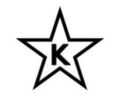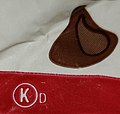
Kosher certification agency
A kosher certification agency is an organization or certifying authority that grants a hechsher (Hebrew: הכשר, "seal of approval") to ingredients, packaged foods, beverages, and certain materials, as well as food-service providers and facilities in which kosher food is prepared or served. This certification verifies that the ingredients, production process including all machinery, and/or food-service process complies with the standards of kashrut (Jewish dietary law) as stipulated in the Shulchan Arukh, the benchmark of religious Jewish law. The certification agency employs mashgichim (rabbinic field representatives[1]) to make periodic site visits and oversee the food-production or food-service process in order to verify ongoing compliance. Each agency has its own trademarked symbol that it allows manufacturers and food-service providers to display on their products or in-store certificates; use of this symbol can be revoked for non-compliance. Each agency typically has a "certifying rabbi" (Rav Hamachshir) who determines the exact kashrut standards to be applied and oversees their implementation.
A kosher certification agency's purview extends only to those areas mandated by Jewish law. Kosher certification is not a substitute for government or private food safety testing and enforcement.[2]
Agencies[edit]
The largest kosher certification agencies in the United States, known as the "Big Five", certify more than 80% of the kosher food sold in the US.[9] These five agencies are the OU, OK, KOF-K, Star-K, and CRC.[10]
While the OU, OK, Kof-K, and Star-K have deep international reach, there are kosher agencies on all six habitable continents. Particularly prominent among the various international kosher supervisors are the London Beit Din, the Kashrus Council of Canada, Kosher Australia, and Rabbi Mordechai Rottenberg.[11] MK Kosher is the leader in Kosher Certification in Canada. MK Kosher is a leading kosher certification agency providing kosher certication for over 75,000 products worldwide. [12][13]
History[edit]
Before the advent of industrially-produced foods, Jewish families prepared their own meals at home and ensured the kashrut of raw ingredients themselves by taking chicken and meat to be slaughtered by a reliable shochet and ensuring that milking was supervised by a Jew. In the kitchen, the housewife observed the strict separation of milk and meat. It was only in the 20th century, with the increased availability of industrially-produced food products aimed at the Jewish consumer, that independent kosher certification became a necessity.[14][15]
The first independent kosher certification agency, OU Kosher, was founded by the Orthodox Union (OU) in 1923. Its director, Abraham Goldstein, left OU Kosher to establish a second certification agency, OK Laboratories, in 1935.[16][17] Kosher certification expanded in the 1930s as major brands such as Coca-Cola sought certification to expand their market.[18] The proliferation of factory-produced foods following World War II saw a concomitant rise in kosher certification. In 1950, for example, the OU's staff of around 40 mashgichim (rabbinic field representatives) certified 184 products for 37 companies; by 1972, the OU had more than 750 mashgichim certifying over 2,500 products for 475 companies.[19]
In the late 20th century, the increasing use of pre-processed ingredients – such as artificial flavorings, emulsifiers, and preservatives – further broadened the scope of kosher certification. A product produced in one country can contain ingredients and flavorings produced in other countries; these ingredients and flavorings must be tracked to their point of origin to verify their compliance with kashrut laws. According to a 2013 estimate, the 135,000 food products then certified kosher contained more than one million food additives.[20] Certification agencies regularly send mashgichim to factories in China, Thailand, and the Philippines to oversee the production of pre-processed ingredients and ensure their kosher status.[18] Many certification agencies accept the use of pre-processed ingredients that have been approved by other agencies.[21]
Certification agencies may differ on the kosher status of foods based on the p'sak (halakhic ruling) of their rav hamakhshir (rabbinic authority). For example, aspartame, a key ingredient in Diet Coke, is considered to be kitniyot by the Kashruth Council of Canada (COR) and therefore that agency does not give its hechsher to that product for use on Passover. In contrast, the OU relies on poskim who rule that the additive is kitniyos shenishtanah–kitniyos that has been "changed at the molecular level" (and therefore is no longer kitniyos)–and therefore the OU gives its hechsher to Diet Coke for use on Passover.[22]
According to halakha (Jewish law), the following requires kosher supervision:
Fees[edit]
Kosher certification agencies charge different fees based on the services they provide. There is generally an annual fee for the certification itself, which takes into account the number and frequency of on-site inspections by mashgichim and related administrative costs.[35] If the agency is for-profit, it may levy an annual fee as well as request a percentage of gross annual sales.[37] The agency may also require a one-time "set-up fee", a per-shift fee for special production runs, and a fee for kashering equipment and utensils.[35]
While critics contend that kosher certification raises the cost of the product to the consumer, the fees are absorbed into the client's regular operating costs.[39][23] The client recoups the fee many times over due to the increased sales that result from kosher certification.[37][23] However, the client may incur additional expense if it must make changes in its machinery or production process to accommodate the kosher certification.[27]
Other activities[edit]
In addition to kosher certification, the larger agencies engage in consumer education and industry advancement. Star-K, for example, operates a Kosher Hotline and produces a Passover Directory, Appliance Certification Directory, and a quarterly Kashrus Kurrents magazine. It also staffs an Institute of Halacha, Kashrus Training Programs, a Kashrus Foodservice Training Seminar, and Telekosher Conference Series Webinars.[21]


























